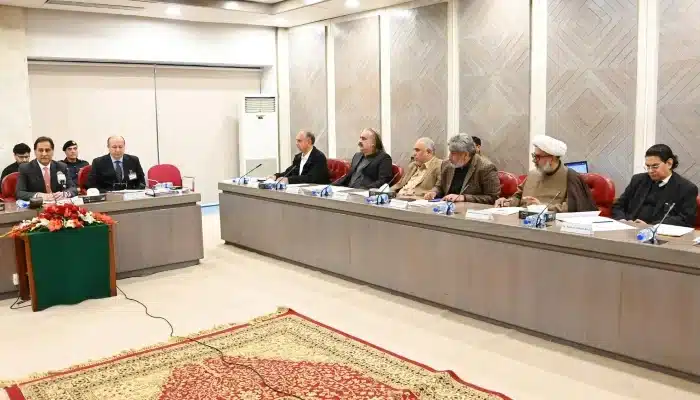ISLAMABAD: The Pakistan Tehreek-e-Insaf (PTI) on Thursday presented its demands for negotiations with the government, seeking establishment of two commissions led by the chief justice or three senior judges of the Supreme Court for investigation into the events related to May 9 and November 24 protests.
In its ‘Charter of Demands‘, the PTI mentions that if the government does not constitute the commissions, the party will abort the dialogue process.
PTI leader Omar Ayub Khan handed over the demands to National Assembly Speaker Ayaz Sadiq, who is facilitating talks between the government and leading opposition party, during the third meeting between the Imran Khan-founded party and the coalition government at the Parliament House in Islamabad.
The conduct of the proceedings of the two commissions, mutually nominated by the PTI and government within seven days, must be open to the general public as well as the media, the party said in its demands.
The former ruling party said the first commission should be tasked to conduct “in-depth” inquiry into legality of the events that led to the arrest and the manner in which Khan was arrested, events that unfolded following the arrest including how people reached high security zones as well as examination of CCTV recordings.
This commission, the PTI said, would also review instances of media censorship and restrictions on reporting on the incident. It will also review internet shutdown and its impact.
Whereas, the second commission, the PTI said, should be assigned to conduct inquiry into the events of November 24-27 in Islamabad, including firing of live ammunition against the protestors, use of excessive force, the number of persons who died, injured and went missing, records of hospitals tampered with and difficulties faced by those seeking to lodge cases.
The party also urged the federal and provincial governments to support the court orders granting bails or suspending conviction and sentences of all political prisoners.
The ‘Charter of Demands’ has been signed by PTI’s Omar Ayub, Asad Qaiser, Ali Amin Gandapur, Salman Akram Raja, as well as MWM Chief Allama Nasir Abbas, and SIC Chairman Hamid Raza.

